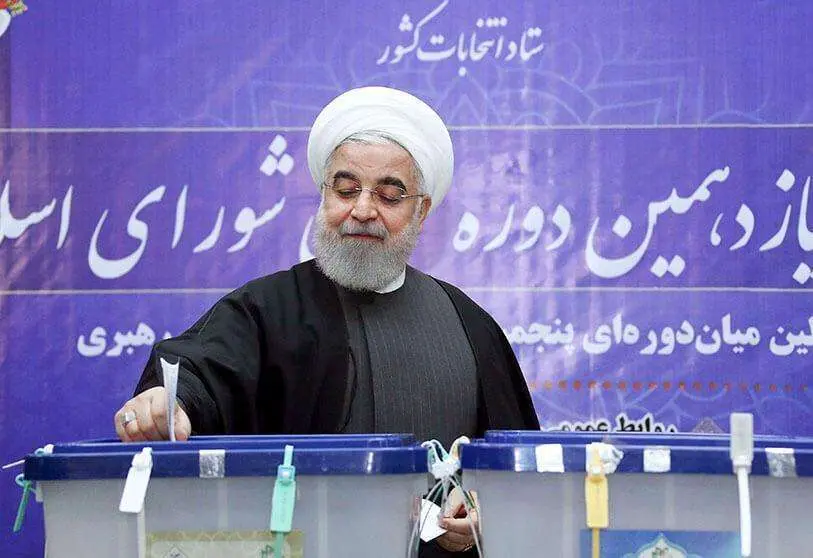Iranian presidential race kicks off with conservative Raisi as favourite

The announcement of the candidates accepted to run for the Iranian presidency next June made the head of the judiciary, the conservative Ebrahim Raisi, the clear favourite in the elections, and surprised by excluding several aspirants with possibilities, such as Ali Larijani.
Only seven of the 592 people who registered made it through the filter of the powerful Guardian Council, made up of six jurists and six conservative clerics, which approves candidates for the elections.
The official list released today by the Interior Ministry shows that the conservatives are in the lead ahead of the 18 June elections and raises fears of a low turnout due to the lack of competition.
As was speculated even before he announced his candidacy, the favourite for this presidential election is Raisi, who has been the head of the judiciary since the beginning of March 2019 and presents himself as "independent".
He is, however, an ultra-conservative cleric who could in the future become Iran's supreme leader and who in the 2017 elections was the main rival of the current president, Hasan Rohaní, who is not eligible for re-election as he has already served two consecutive terms.

Political analyst Ardeshir Pashang, from the Middle East Center for Strategic Studies in Tehran, told Efe that "the most relevant candidate" is Raisi and that "there has been a serious cohesion of factions behind him".
Already last night, top general and former defence minister Hosein Dehqan and former oil minister Rostam Qasemi resigned in favour of Raisi. Other conservative hopefuls are also expected to endorse him during the election campaign.
Conservative candidates accepted by the Guardian Council include Mohsen Rezai, secretary of the Discernment Council and former commander of the Revolutionary Guards, and Said Yalili, former secretary of the Supreme National Security Council and former nuclear negotiator.
Two other contenders from this bloc will also run, albeit with a lower profile: Deputy Speaker of Parliament Amir Hosein Qazizadeh Hashemi and MP Alireza Zakani.
Registering as a candidate in mid-month, Raisi said he seeks to create "a strong Iran" and resolve problems such as "weak executive management and the deviant approach to the fundamental ideals" of the 1979 Islamic Revolution.
Raisi's main rival in the presidential election was expected to be Larijani, who was speaker of the Iranian parliament for 12 years between 2008 and 2020 and currently serves as an adviser to supreme leader Ali Khamenei.
The rejection of his candidacy has caused astonishment and has even led Raisi to intercede and consult with the aim of making "the electoral scenario more competitive and participatory", the cleric said.
In Pashang's opinion, "the composition of the list of approved candidates does not create a serious competition" and this will have "a negative influence on the turnout".

In a statement, Larijani explained that he ran as a candidate "in accordance with Islamic, national and revolutionary duty" and that he was determined to "solve the problems facing the nation".
Accepting the veto, he thanked "all those who expressed their gratitude in this short period of time" and urged people to vote in the elections despite his disqualification.
In a recent interview with Efe, Ahmadinejad warned that if he were to be vetoed, voter turnout would be "very low" and he would neither vote nor support any candidate.
The current first vice-president, Eshaq Yahanguirí, has not been accepted by the Guardian Council either, whose veto was not expected and leaves the country's reformist and moderate sector "orphaned" in these elections.
Yahanguirí was the preferred choice of this sector after the decision of the head of diplomacy Mohamad Yavad Zarif not to run in the elections.
According to Pashang, the reformists wanted to put forward Zarif as their main candidate, but his possible candidacy was thwarted after a leaked recording of him criticising the Revolutionary Guards.
With Yahanguiri and also Laiyani, who in the expert's opinion was "a consensus candidate of the moderates and reformists", being ruled out, this sector "will have a difficult situation in the elections".
The only approved candidates who can be considered representatives of this bloc are Central Bank Governor Abdolnaser Hematí and former Vice-President Mohsen Mehralizadeh, but, as the analyst stated, they are "little known and influential".
As of today, the candidates can begin their election campaign, which will end 24 hours before the polls, where it seems that the only thing that will be at stake is voter turnout.








